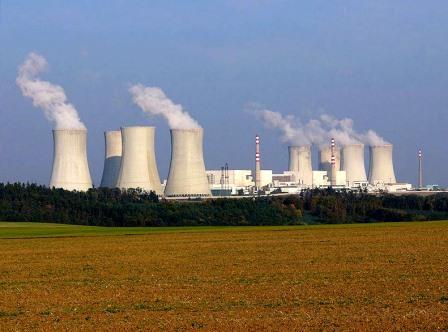Sequence Matters
by Herman Daly

When prioritized over sustainability, techno-fixes are often dangerous. (Image: CC0, Credit: Not available)
The main message of the controversial documentary, Planet of the Humans, is that unrestrained economic and population growth should be the target of environmentalists’ efforts, not technological fixes. Techno-fixes can be helpful, but belong in second place. If put in first place they are often dangerous (e.g., nuclear power, green revolution, biomass fuel, space colonization, etc.). Technocrats enjoy usurping first place and are not humble about it.
In reviews some have alleged that Michael Moore and Jeff Gibbs (producer and director, respectively) must be misanthropists, eco-fascists, racists and sexists, as well as shills for fossil fuel interests. Maybe they are just filmmakers who sometimes overstate an important truth that they are trying to present to an unreceptive audience. When the ideological dust settles maybe there can be a reasonable debate on the proper sequencing of limiting growth vs. accommodating growth by technical fixes.

Michael Moore, inveterate challenger
of the status quo; suddenly a shill for
fossil fuel interests?
(Image: CC BY-SA 2.0, Credit: Nicolas Genin)
Big Environmentalism had a reason to put techno-fixes in first place—to avoid confronting the Great God of Growth, and thereby offending wealthy contributors, politicians, and technocrats. Big Green suggests that a policy of complete substitution of fossil fuels by renewable energy is viable. It would surely be viable at some smaller scale of population and per capita resource use, but not at the present scale, not in a reasonable time period, and certainly impossible at the continually growing scale advocated by most economists and politicians. But neither Big Money nor Big Green can accept an end to economic growth, much less a decline.
However, technocrats should be given a chance and encouraged to prove their worth—in the proper sequence. Let us first limit growth in resource throughput, and then encourage the technologists to grow our wealth by increasing resource productivity, rather than growing the volume of resources depleted and transformed into polluting wastes. Sequence makes a difference. First put on your pants—then your shoes.
A further challenge raised by the documentary is to recognize that the environmental movement is failing. We are losing the game—just read the newspapers! As my high school tennis coach frequently had to remind me, the first rule of strategy is to “always change a losing game.” The documentary invites us environmentalists to change our losing game. The invitation was dramatic, poignantly graphic, and forceful. It was also rude, ungenerous, and sometimes unfair. But if it had been polite and technically impeccable I’m afraid we would still be sleepily trying to pull our pants on over our shoes.







Herman Daly makes important points regarding the Moore-Gibbs film. I agree with them. However, I give the film low marks for inaccuracies. There was no cause to go after Bill McKibben. I believe the culprit to our growth problem is capitalism. .
I agree with both Mr Willer and Mr Daly. Film makers that tackle sensitive issues that Planet of the Human’s does always runs the risk of offending and being unfair to those we don’t really want to. I’m more concerned about those inaccuracies. The hardest thing we human beings are going to have face is our real limitations and this was brought up in the film. The transition to a sustainable future will have include facing our mortality and dealing with what it means to be human. We can’t continue the present status quo.
Now Herman Daly is one of my heroes and his work on the steady state economy is simply brilliant. However the ‘Planet of the Humans’ doco does not show this brilliance, nor does it meet standards of academic or journalistic truth. It is a highly biased attack on renewable energy. The claim we must have fossil fueled baseload power is false, many alternatives exist. The Energy Return on Investment argument is simply wrong, see https://reneweconomy.com.au/five-reasons-why-michael-moores-planet-of-the-humans-is-a-bad-mistake-92497/ . Re sequence I differ with Herman, we need both to break the endless growth myth while at the same time we need appropriate technology to move to a zero carbon economy. That is renewable energy. The two need to work together. Docos that distort the facts (like Planet of the Humans) are not helpful to either. In any case this doco does not support a SSE, it means overpopulation and the growth economy only in passing. Its key focus was to seek to mislead people so they withdraw their support for renewable energy, one of the few promising appropriate technologies we have. I write as a longtime advocate of the SSE but also as an environmental scientist who has properly researched renewable energy.
Many renewable energy researchers agree that the fastest way to mitigate climate change, most air pollution and much land degradation and water use is to transition to renewable electricity and energy efficiency and, at the same time, electrify most transport and non-electrical heat. This would account for about 80% of greenhouse gas emissions.
It is entirely possible for many countries, states, regions and towns to achieve the first step, 100% renewable electricity, within 15-20 years, given the political will. Indeed, several places – e.g. Denmark, Scotland and South Australia – are already on track to achieve this, Two North German states are already at 100% net renewable electricity (annual average).
But, to achieve an SSE with full or nearly full employment within a few decades is rather optimistic to say the least. Especially in the 21st century, technological transitions can take place much more rapidly than socioeconomic transitions (apart from socio-economic collapse). As Haydn Washington points out, we need people to work on both technical and socio-economic transitions, without supporters of one transition undermining the other transition. Both are essential.
I would love to write a more detailed article making this case on the CASSE website, but so far only articles published here have been sceptical of ecologically sustainable energy.
Excellent, well said. I agree despite its many shortcomings it carries the message.
May I add that a lot of erroneous and misleading propaganda, including the Gibbs-Moore film, is being published against the transition to ecologically sustainable energy, i.e. renewable energy and energy efficiency. Much of this propaganda comes from vested interests and their supporters in the media, government and the research community. Scholarly refutations have been published (e.g. Diesendorf 2016; Jacobson et al. 2017; Brown et al. 2018; Diesendorf & Elliston 2018), but sadly some members of CASSE seem to be unaware of them. We need both SSE and the energy transition to be implemented ASAP.
References
Diesendorf M 2016. Conservation Biology 30 :666-669.
Jacobson MZ et al. 2017. PNAS. http://www.pnas.org/cgi/doi/10.1073/pnas.1708069114.
Brown et al. 2018. Renewable & Sustainable Energy Reviews 92:834-847.
Diesendorf M, Elliston B 2018. Renewable & Sustainable Energy Reviews 93:318-330.
Herman Daly, you’ve been my inspiration for decades in my research and teaching career, but I have to disagree with your assessment of this film. The inaccuracies and blatant distortions will be the only things that matter in the long run. This film will put the environmental community at each others’ throats, and the professional climate denial industry will mercilessly use this film to discredit all environmentalism– they already are. Mercenary fossil fuel propagandists like Myron Ebell, Marc Morano, Climate Depot, the Heartland Institute, etc., are gleefully using this film to “prove” that the climate crisis is a giant fabrication by self-interested leftist elites. They did the same thing with so-called “climate gate” in 2009, and that did lasting damage to the climate movement even though there was no “there” there. This is bigger–they’ll be using Michael Moore’s film to discredit the entire climate movement for another decade– a decade we absolutely can’t afford.
I have also been inspired by Herman Daly’s work and the idea of a Steady State Economy.
But it is disturbing to see the mischief being generated by conservative media over this very inaccurate and misleading ‘planet of the Humans’ film. While I understand the comments made by Herman and the ones by Brian, made initially, I am also aware how some can use Renewables to “Green wash” their business agenda. Some claim we can Decouple our economies from the destructive effects of growth oriented economies., I agree this is madness. But the fact is that Renewable energy offers so much hope and many possibilities for aiding the transition to a decentralized energy production services. These can support new sustainable agricultural industries in regional areas & assist the growth of a raft of new sustainable manufacturing industries. It seems a mistake to label Renwables as merely a green wash ,or a Techno Fix. The potential for supporting sustainable developments is great. Consequently they should not be dismissed as just a techno fix. Many environmental activists (and CASSE NSW members,I suggest) see value in embracing renewable energy, because it provides a credible path toward such industries and an important element in the transition to a SSE As Mark Diesendorf has shown via his research, the renewable energy sector challenges the “baked in” political rhetoric of the fossil fuel lobbyists, Renewables are not “pie in the sky or bogus”. Rather they provide cheaper easier to install (far less environmentally destructive) power & lower maintenance cost & free fuel.. Their EROI ( life time energy output/ its life cycle energy output ) is excellent, Hence pay back period is shorter than conventional coal fired power plants or Nuclear (see Mark’s work),..Hence fossil fuel plants cannot be justified even by their old poor arguments, which never accounted for externalities (, i.e. true cost). So Renewable sector is a valuable plank in the transition to a sustainable SSE.
While I would agree with everything you rightfully point out, the point of the film as well as what Herman Daly and Brian are pointing out as well is being missed in this flurry of criticism as important as it is. Can we try to focus on that and what that means. Unfortunately, films such as this recent Gibbs/Moore production may not aid us in this endeavor because of how the message was delivered.
So far everyone is making good and valid and important points. But the basic point of this film, unfortunately is getting buried because of how it was constructed and delivered. That point is quite simple: technology no matter what is not going to solve the crisis that we are in. It’s not a matter of mixing both the social/political with technological fixes. The film is clear on that to the possible frustration of critics. Only a human solution will do and that’s what Herman Daly is trying to point out too: we need to put our pants on before our shoes and our pants is addressing who and what we are how we are going to live on this planet with real, powerful energy limitations. Trying to have our current energy consumption cake( and to grow that consumption to boot) and to eat too it is, I’m afraid, delusional. We need to renew genuine community instead of what our current economic/financial system is dictating: competition for energy for the empowerment of isolated individuals. WE are the solution and always have been.
Right on the mark, Nicholas. While a shift in Technology is important, the FIRST thing Humanity needs is a paradigm shift in our ethical worldview regarding the ecosphere. At its root, our problem is more ethical than technological. Simply put: we humans are not “superior” to all other life forms; whether “Green” or not, unlimited growth on finite Spaceship Earth makes no sense in the long run; and, Green Energy alone will not solve the problem of overconsumption by developed countries and the resulting eco-damage. First things first— Ethics.
Absolutely, first sustainable scale, then efficient allocation. Always such clarity! I’ll add some confusion to the issue. If they were properly understood by technocrats, these ‘allocative-efficiency’ efforts could be used to limit the size of the economy. Replacing the fossil fuel industry will not grow the economy, as “green growthers” presume, any more than hiring someone to fix your car will add to your net worth. Similarly a carbon tax will not help to grow the economy! If costs increase at the base of the economy, these costs are amplified as they ripple through the supply chain stages of ‘added value’. Green growth policies should really be understood as a means for managing degrowth. And, we should plan for and anticipate degrowth, because our investments should be appropriate for the resulting scale of the economy.
Steady State Herald Submission Guidelines – Introduction
(For commenters interested in submitting articles.)
The Steady State Herald is CASSE’s blog. As such, it is one of the leading media outlets on the steady state economy. It is intended for a general readership, not as an academic or technical publication. We publish articles once per week (typically Wednesdays), with foreseeable plans for biweekly and eventually daily articles.
We encourage writers to read our previous posts to see the types of articles we publish. We are especially interested in assessments and essays that focus on limits to growth, ecological and steady-state economics, and degrowth. We also cover the conflict between economic growth and: 1) environmental protection, 2) economic sustainability, 3) national security, and 4) international stability.
We also accept articles on other topics, especially if presented within an explicit context of limits to growth. We occasionally publish articles with no explicit connection to limits to growth, yet with very clear relevance thereto.
Please email [email protected] for more information.
The solution to our environmental problems lies not in alternative energy, but rather in the alternatives to energy.
“Planet of the Humans” is probably the most important film of the decade.
Dear Mr Stumm, by “alternatives to energy, may I assume you mean alternatives to our increasing energy consumption. So, that we need to envision radically new ways to live in a finite world of available energy and other resources rather than rely on purely technological approaches. I completely agree: it’s how we live that comes first and then the realization of Technics that are congruent with our understanding of real limitations. This is the basic message of this film and what Mr Daly speaks about in my view.
Dear Mr. Marconi, Absolutely, we are in concurrence. As an engineer I have looked at this “climate problem” (and actually we are talking about so much more) several times over the past forty years, and always come to the same conclusion. Although technologies toward greater energy efficiency, and away from carbon fuels are good things, they are all belittled by the problem facing us; especially since China industrialized with 1.4 billion people. The film states the very same conclusions that I come to. That is why I am so excited about it, and also the subsequent corollary discussions. Ultimately, it is not a technical problem we are facing, but a social and economic one. Yes, we need to reconstruct the very foundations our society is built on, and principally our values. There are people’s on this planet who live quite happily with very little energy. We in the industrialized world call them “primitive”, but are they really? Instead of trying to “modernize” them, possibly we in the industrial world ought learn something from them; i.e the “alternatives to energy.”
Yes, I agree, the problem we are facing is not primarily a technical one…but as you rightly point out a “social and economic.” I would also add a political one, but that goes under the first two you mention. I’m afraid, the task of learning those spiritual values based on simplicity, “enough” and I might add responsibility is going to be very hard for most people who live in highly industrialized societies. We’ve gotten used to believing in a false sense of freedom based on individual empowerment( through a dysfunctional monetary system) at the expense of communal mutuality. But, we can learn, if we wanted to, to live differently and more in harmony with one another and the precious, finite, earth we call our home.
“The main message of the documentary, Planet of the Humans, is that unrestrained economic and population growth should be the target of environmentalists’ efforts”.
I completely agree with this message. Therefore, all the environmentalists should fight against the overpopulation, which is the reason of economic growth. But the main reason of overpopulation in America is immigration. To defend the environment, we should immediately stop the immigration into the USA. This is the most important thing which can be done to defend environment.
Neither “Planet of the Humans” nor comments thereof are correct. We have to start with where we are right now with 7 billions. Even at replacement worldwide, world population will rise to 10 billions and perhaps 12 billions. Just water and sewerage treatment for the additional persons will require another 10 terawatts continuous power, twice year 2000 world energy production (1 Je = 3 Jt).
There is also the problem of phosphorus. Presently 200 megatonnes per year phosphate rock is mined and converted to 0-54-0 fertilizer (phosphoric acid). The conversion uses more than half the world’s sulfuric acid production. 9/10 world sulfur production comes as a byproduct of fossil fuel production. The rain forests are being chopped down for the phosphorus. Most of the Frash sulfur production is shut down or used up.
So another few terawatts continuous power will be required to produce electric furnace phosphoric acid and hydrogen for ammonia.
So, net result: we need multiples of world continuous power production just to feed and water the existing population and projected future population, even with replacement reproduction rate. The good news is that the 200 metatonnes per year phosphate rock brings with 20,000 tonnes per year uranium. 5 billion year half-life, presently going on the ground. In general, agriculture is exempt from radiation laws. The uranium use to be extracted, but the price fell too low. Burning this uranium up in fast-neutron piles will produce 3 times present world energy consumption. Resulting fission product curies falls below uranium curies consumed in less than 1000 years. Nukes consume radioactive waste. Tough to find justice in the dark. Only viable alternate is back to the collective farm, a Quan Jue world economy
Dear Mr Smith,
Here’s a good definition of over population: “Over population occurs when a species exceeds the carrying capacity of its ecological niche. It can result from an increase in birth rates( fertility rate), from an increase in the mortality rate, an increase in immigration, or an unsustainable biome and depletion of resources.” from a Wikipedia article.
Actually this definition or better description is excellent. Economic growth is really multifactorial, an increase in the numbers of human beings is one; but, the main reason. Economic growth is the result of an increase in energy use, consumption, or rather the increase in energy use is the result of an increase in the production of consumer goods and services; this, in turn happens to be an economic/financial imperative because of the kind of an economic-financial system we presently operate with. It is not the direct result of an increase in population as we may think. An increasing population can only be the result an, at present, level of available surplus energy. We may have, indeed, sudden, local instances of overpopulation resulting say in hunger or displacement of peoples where there is an acute shortage of required resources. But, this is more likely right now due to political and economic factors. We put the cart before the horse when we say there human suffering in these cases is due to an increasing population. This thinking plays right into the hands of mainstream economic theory, better known as neo-liberalism.
The bottom line is that the amount of immigration into the US is not causing any level of poverty of unsustainability. It is the continued reliance on the fallacious economic thinking and an inability at present to see the common good as the basis for a united humanity. We know, that when the needs of those immigrants across( seeking the rich energy source here in the US) can be met in their own locations or origin, much of this immigration could be obviated.
Herman’s blog offers the brief suggestion: “Let us first limit growth in resource throughput, and then encourage the technologists to grow our wealth by increasing resource productivity …. Sequence makes a difference. First put on your pants—then your shoes.”
This is good advice in normal circumstances, but not when your pants are on fire. Planet Earth is very close to a tipping point into irreversible climate change that could make vast areas unfit for habitation by humans and many other species for at least thousands of years.
Therefore, Herman’s point the “sequence matters” needs closer examination. It’s obviously sensible, for individuals who research ecological economics and organisations like CASSE that educate and campaign for an SSE, to make that their top priority. However, it’s not obvious that climate activists and governments should ignore the fact that the world is burning and delay their action to phase out fossil fuels. Bill McKibben’s top priority does not have to be the same as Brian Czech’s. Last southern Spring and Summer, my country, Australia, was burning with a ferocity and duration never seen before.
Transitioning to a so-called ‘SSE’ in which most energy is still supplied by fossil fuels is not an SSE at all. Because of the long residence time of CO2 in the atmosphere, almost any net emission of CO2 pushes up the temperature. So an SSE needs 100% renewable energy. Also, the existing transition to 100% renewable energy will go faster when energy demand is reduced. Therefore, as a society, we must do both transitions, energy and economic activity, simultaneously. It’s too late for ‘sequence’.
It seems to me that this debate has been fueled by misunderstanding the language we’ve been using. Clearly we are all on the same page as to the ultimate goal: the transition to a human planetary presence that respects real ecological limits. I think Mr Diesendorf is right and so is Mr Daly. The question is how do we organize ourselves to aid that transition when powerful interests block the way and when those interests control the very means by which we provision ourselves and when many of us believe in that system? Relying on the current for profit market system won’t work in the short run and especially not in the long run. Decreasing consumption which is the way to decrease ecological damage means decreasing energy consumption which means decreasing the concentration of profits which means degrowth. But, we will still need energy consumption and that means a near or total transition to 100% renewable energy. Technologies that.have the least damaging impact on the environment should be encouraged; but our present economic’/financial system won’t encourage any innovations that don’t promise profits. So let’s stop arguing about timing; what we need is organizing ourselves to live within the sustainable limits of our world ecoshpere; but that means going way beyond our present economic system and coming up with ways to provision ourselves without relying on the profit motive.
“coming up with ways to provision ourselves without relying on the profit motive.”
Mr. Daly and others have pointed out how to “provision ourselves without relying on the profit motive” which involves changing the money system from a private money system that issues all money as debt (credit used for money) for profit. If the ‘first cause’ of money is profit, you have a for-profit society. However a sovereign money system creates money as a permanently circulating asset issued for public purpose. This has long been known to be the only way to create long-term stability. It would in fact create an economics of care instead of this economics of greed, because of the ‘first cause’ of sovereign money. Money has psychological consequences so it is important to do it right.
Mr Switzer,
Thank you for responding to my comment. The idea of a “sovereign money system” is interesting to help “create an economics of care.” Unfortunately money has more than psychological consequences; it also has powerful political ones as well. But that said, I do believe if you and I went further in our interchange we would discover much common ground. For me it is in the quality of our communicating that matters most and money and the way we live depends upon this. We need to transition to a SSE economy and what I say is a planetary unified society; but not by way of the current for profit commodity-exchange system which forces us to be socially isolated from one another, to live non-communally, and to adhere to a growth oriented economy which can’t work for us as human beings or ecologically.
Herman Daly’s bald statement that “the environment movement is failing. We are losing the game”, needs some qualification. Taken out of context, it could be used by vested interests to further weaken the movement environmental laws and regulations.
We are indeed facing dire environmental impacts, including climate change, air pollution in cities, loss of biodiversity, land/soil degradation, overuse and pollution of fresh water, and widespread pollution by toxic chemicals. However, without the environment movement, the situation would be much worse. Some of the achievements of the environment movement, admittedly mostly geographically limited, are reductions in air pollution and termination of the deadly London smogs; the clean-up of rivers such as the Thames with fish returning; the creation of national parks in almost every country; restrictions on land clearing; and some controls on the release of chemicals into the environment.
In particular, all except the last of the dire environmental impacts listed above would have been much worse in the absence of increasing energy efficiency and renewable energy. Energy efficiency reduces demand. Although there is some rebound, its magnitude is generally much less than the energy saved. Renewable energy substitutes for energy from fossil fuels. It has not, and does not at present, drive new demand. As most supporters of a steady state economy understand, demand is driven primarily by consumption, that is, the product of population and consumption per person. This should be the focus of CASSE’s work. However, if renewable energy becomes very much cheaper than fossil fuels in future, then it could also contribute to future demand growth.
That’s not a good reason for undermining renewable energy and accelerating global climate change. It is a good reason for building bridges with the renewable energy movement instead of putting it down and alienating it, as some people (not Herman) have done in this blog.